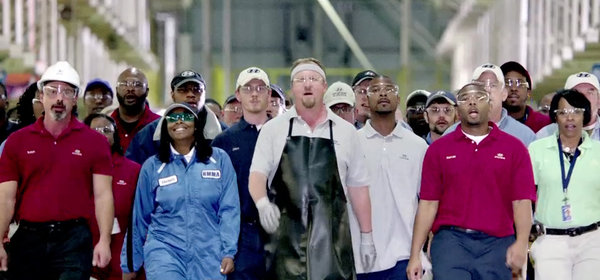
By STUART ELLIOTT Published: February 15, 2012
BLUE-COLLAR workers in fields like manufacturing — particularly when they make products on American soil — are again becoming a favorite subject for white-collar workers on Madison Avenue.
The trend was born of the economic worries that followed the financial crisis in 2008. Recently, it is gaining steam — appropriate, since the ads often use blasts of steam to signal something is being built — with proposals in Washington to offer incentives to encourage the location or relocation of factories in the United States.
“We continue to see very heavy emotional response to anything that would leverage against the bad economy,” said Robert Passikoff, president at Brand Keys, a brand and customer-loyalty consulting company in New York.
The trend is even extending beyond advertising. For instance, “ABC World News” is running a series of reports under the rubric “Made in America,” in which anchors and reporters celebrate a preference for buying merchandise made in this country.
The most notable moment to date in the trend came on Feb. 5, when Super Bowl XLVI was played, as marketers paid NBC tens of millions of dollars to run commercials with work themes before the game, during the game and during halftime.
Those commercials included spots for General Electric, part of a campaign carrying the theme “G.E. works,” that celebrated products like refrigerators and turbines being built in the United States; a spot that showed a bottle of new Bud Light Platinum beer being produced in a plant that looked more like a factory than a brewery; and a spot for Hyundai, featuring workers employed at its first American factory, in Montgomery, Ala.
The Hyundai commercial, titled “All for One,” “was intended to celebrate Hyundai’s spirit of trying new things,” said Steve Shannon, vice president for marketing at Hyundai Motor America. “An example is certainly our growth and capabilities in the U.S.”
“Although we didn’t develop ‘All for One’ specifically to communicate a ‘made in the U.S.A.’ message,” he added, “it became part of the story we wanted to tell.”
•
No work-themed commercial that Super Bowl Sunday drew more notice than a spot from the Chrysler Group, known as “Halftime in America,” which featured Clint Eastwood declaring that “the world’s going to hear the roar of our engines.” The spot generated a national debate that was even spoofed on “Saturday Night Live.”
The purpose of the Chrysler commercial, and the others in the genre, was summarized in a speech by Sergio Marchionne, chief executive at the Chrysler Group, to a group of dealers. The intention is “a call to take action to reconsider and contribute to this great land’s economic progress,” he said. “It’s simply a way of saying that everyone, in this land, has the right to dream and the power to turn that dream into reality.”
Another example of the trend also arrived last week when the Tropicana Products division of PepsiCo augmented a campaign for Tropicana Pure Premium orange juice, which carries the theme “Tap into nature,” with ads that play up the provenance of the oranges.
“Grown, picked and squeezed in Florida,” print ads proclaim. “Tropicana Pure Premium is 100% pure Florida orange juice.” In a television commercial that made its debut during the CBS coverage of the Grammy Awards, orange crates labeled “Tropicana Pure Premium 100% Florida” are displayed four times in 30 seconds.
Tropicana Pure Premium had been made solely with Florida oranges until 2007, when PepsiCo began mixing in oranges from Brazil.
That decision, and a similar step by the Coca-Cola Company, which sells orange juices bearing brands like Minute Maid and Simply Orange, led a competitor, Florida’s Natural, part of Citrus World, to add a logo to its packages composed of an American flag and the words “Product of U.S.A.”

(Now that Tropicana Pure Premium has returned to its all-American orange sourcing, Florida’s Natural is proclaiming in ads and on its Web site: “All Florida. Never imported. Who can say that?”) – To that I say, Natalie’s Orchid Island Juice Company is the ONLY Made in USA Certified Orange Juice in the United States of America. Look for the USA Certified Seal.
The timing of the Tropicana Pure Premium campaign “is based on 100 percent Florida Tropicana Pure Premium being nationally available,” said a spokesman for Tropicana Products, Michael Torres.
•
In several instances, there is more to the American-centric efforts by marketers than commercials. For instance, Tropicana Products also changed the labels on packages of Tropicana Pure Premium, adding a sentence that reads “100% pure Florida orange juice.”
And the “G.E. works” campaign is being accompanied by initiatives at General Electric like a four-day conference in Washington this week, meant to shine a spotlight on “what works in America,” as the company described it.
At the conference, Jeffrey R. Immelt, chairman and chief executive at G.E., discussed plans that include the opening of three G.E. Aviation plants in 2013, in Alabama, Mississippi and Ohio, and the company’s hiring of 5,000 American veterans in the next five years.
For all the drumbeating for American workers, said Mr. Passikoff of Brand Keys, his research indicates that many consumers do not shop specifically “for something made in one place or another” because they have heard “in the past 20 years so much talk of a ‘global economy.’ ”
For example, in the automotive category, where a car is built “is not one of the drivers, pardon the pun” in deciding whether or not to buy it, he added.
A version of this article appeared in print on February 16, 2012, on pageB6 of the New York edition with the headline: This Column Was 100% Made in America.
For a list of the current Made in USA Certified companies, please visit The Made in America Movement website. The list is updated weekly as new manufacturers obtain the USA Certification.